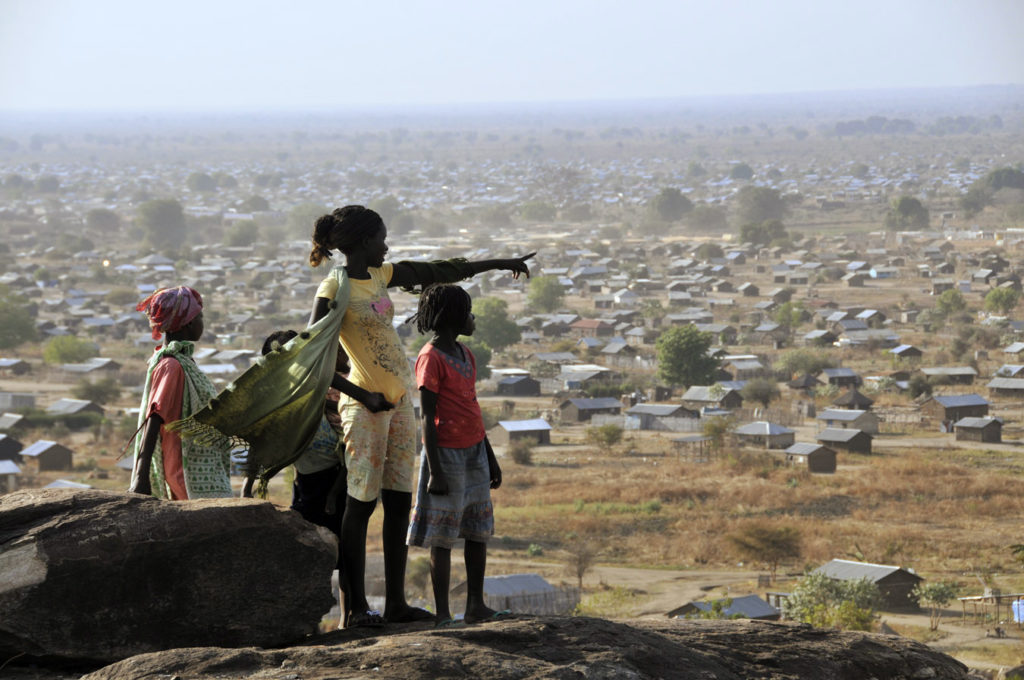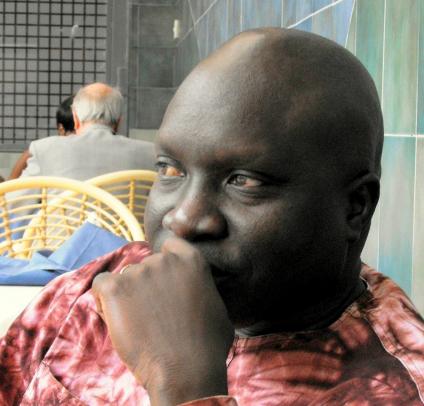Al-Bashir chose his words carefully from a written script and our people even clapped for him for the last time. I was happy that the drummers and excited dancers were kept in the background, far from Al-Bashir who likes dancing at rallies. Had he danced he might have said something else, which would have invited boos.
VICTOR LUGALA

A group of girls looks across Juba, Sudan, from atop a hill overlooking the city. Voting begins Sunday for the referendum of self-determination of Southern Sudan.
In 2002, Daniel arap Moi’s 24-year rule ended when he handed over power to the current Kenyan president Mwai Kibaki. The transfer of power was democratic. Popularly known by Kenyans as the Professor of politics, Moi first ruled Kenya through a one-party system, which was characteristic of most post-independent African countries of the ‘60s and ‘70s. However, with the collapse of the Soviet Union, and when the currents of democracy started blowing across Africa in the early ‘90s, Moi was quoted as saying that democracy begets tribalism.
If you look at it from the point of view of Michela Wrong’s book, It is Our Turn to Eat, about a Kenyan whistle blower on corruption, Moi can be vindicated. The then doyen of opposition politics in Kenya, the late Jaramogi Oginga Odinga once described Moi as a political giraffe with a long-range vision.
When Moi was about to retire he picked Uhuru Kenyatta, the son of Kenya’s first president Jomo Kenyatta, as his successor. But Uhuru was beaten hands down by Kibaki in the 2002 elections.
In December 2002, during the inauguration of the new head of state, Mwai Kibaki, before a huge crowd of supporters, Moi was present to hand over the instruments of power to his successor. It was a moment he will probably never forget. The old man was humiliated by irate and unruly slum youth who pelted his motorcade with balls of wet mud and twigs.
For a retiring head of state, this was uncalled for. It was a rude send-off. It was totally un-African for young people to humiliate an old man who was supposed to give them paternal blessings. They got a curse.
Four years later, in 2007, the same rowdy youth were to slaughter themselves in tribal and communal violence, when some of them charged that the man they supported in 2002, Kibaki, had stolen the presidential election. Post-election violence claimed more than 1300 lives.
Such violence has wounded the psyche of the Kenyan nation and caused an irreparable damage to a generation that has sunk into tribal politics that grind to a halt the wheels of progress in Africa.
Young and Vulnerable
Despite their physical strength, young Africans are psychologically, financially and sometimes intellectually vulnerable to the machinations of crafty politicians. Hence, they are easy to mobilise to do dirty things for politicians. They are the child soldiers wasting in the jungles of Africa. They are cheap guns for hire as goons to disrupt political rallies and to boo political opponents. And when hell breaks loose, they are the first victims, causing pain to their parents and community where they were born and raised.
Because of selfish interests, African politicians are responsible for destroying the lives of the youth instead of growing leadership among them to take over the leadership baton tomorrow when the sun sets on the aging politicians who straddle the continent and cling to power like dinosaurs.
The closest the President of Sudan Omar Al-Bashir was almost booed in Juba was some time when he made some promises at a rally packed with young people. Each of his empty promises was met with a rejoined chorus “wele!” as if they were reading from the same script.
Although he was a colonel in Upper Nile during the war, Al-Bashir does not understand Arabi Juba. The Field Marshall was lost, for he knew not that “wele” was pejoratively used to mean negative.
The only positive landmark that will remind us of Al-Bashir is a half-kilometer stretch of tarmac road along Juba-Yei road near Kujur hill, so I am told.
Hate him or love him, the CPA was negotiated in Al-Bashir time and we also became an independent and sovereign state in his time. When a former enemy gives in to your pressure, you can only invoke what President Salva kiir said in his Independence Day speech. He said his government forgave Al-Bashir and his people their iniquities, but certainly, “we will not forget!”
When Al-Bashir graced our independence event, I was afraid that our youth would hackle or boo him and put us to shame in the eyes of the international community through the lenses of CNN, Al-Jazeera, BBC and others.
On the contrary, my people blew air on the healing wound in our hearts and conducted themselves with dignity and respect befitting people of a nation born in the 21st century.
Al-Bashir chose his words carefully from a written script and our people even clapped for him for the last time. I was happy that the drummers and excited dancers were kept in the background, far from Al-Bashir who likes dancing at rallies. Had he danced he might have said something else, which would have invited boos.




